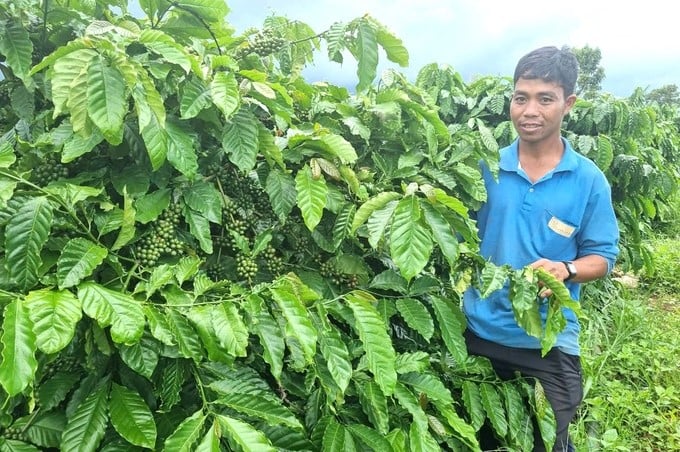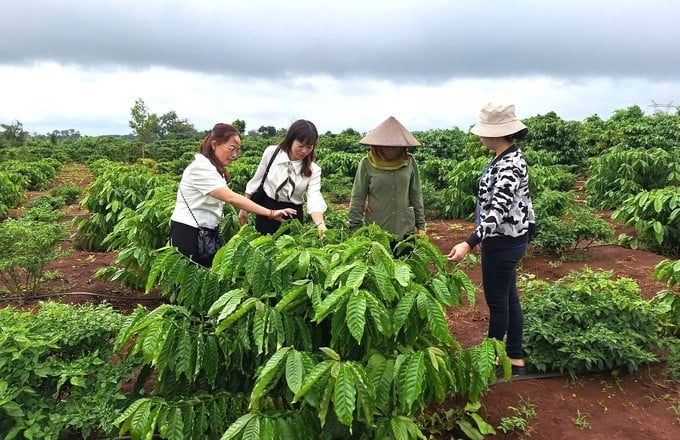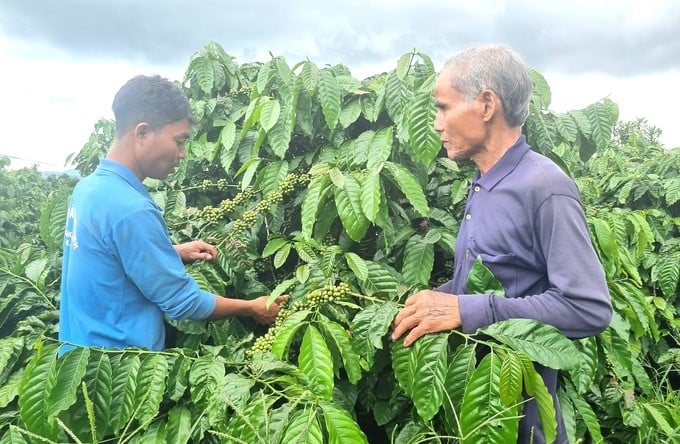May 24, 2025 | 16:23 GMT +7
May 24, 2025 | 16:23 GMT +7
Hotline: 0913.378.918
May 24, 2025 | 16:23 GMT +7
Hotline: 0913.378.918

The replanted coffee garden of Mr. Xuan's family enters the main harvest crop. Photo: Tuan Anh.
Dak Doa district is one of the localities with the largest coffee area in Gia Lai province, with more than 28,000 hectares. In the 2020–2024 period, people in the district have replanted more than 1,500 hectares to replace old and stunted coffee gardens with varieties that do not ensure quality, leading to poor productivity.
Previously, Mr. Xuan's family (Glar commune, Dak Doa district) had an old and stunted 700-tree coffee garden with low productivity. After consulting many places, Mr. Xuan chose to use dwarf and TR4 varieties to replant the coffee garden.
"After 2 years of planting and caring, there were about 70 coffee trees bearing fruits; the family earned more than VND 8 million. This year, entering the main harvest crop, revenue is expected to more than double compared to last year," Mr. Xuan shared.
According to Mr. Xuan, to ensure sustainability of coffee replanting, the most important stage is soil treatment. It takes at least 1 year to improve the soil before sowing coffee seeds to achieve efficiency. Otherwise, coffee is susceptible to pest, disease, and nematode attacks.

The replanted coffee garden of Ms. Huong's family. Photo: Tuan Anh.
Similarly, over 4 years, farmers in Chu Se district have replanted more than 1,100 hectares of coffee. Thanks to following the correct replanting process and bringing high-quality varieties into production, most coffee gardens grow well, and yield and quality are guaranteed.
The 1.4-ha coffee garden of Ms. Nguyen Thi Huong's family (village 5, Ia Pal commune, Chu Se district) was planted before the year 2,000, so it has become old and stunted. On average, it only yielded about 2 tons of beans/ha. Realizing that if they continued to take care of the coffee garden, the family would not be able to cover the costs. By 2021, with support for the cost of purchasing TRS1 hybrid Robusta coffee seedlings, Ms. Huong has replanted the garden.
"Even though it has only been 2 years since replanting, 700 coffee trees have yielded more than 7 tons of fresh fruit. Meanwhile, the 700 new trees replanted in 2023 are also growing very well," Ms. Huong shared.
To promote coffee replanting, every year, Chu Se district spends part of its budget combined with socialization funding to support people.
Mr. Le Sy Quy, Director of Chu Se District Agricultural Service Center, said that in recent times, the unit has coordinated with communes and towns to organize training and guide people on planting and care techniques for coffee gardens replanted in an organic and sustainable direction. Thanks to that, replanted coffee areas that have been put into business give high productivity, reaching 5-6 tons of beans/ha. Compared to previous old and stunted coffee gardens, replanted gardens yield 10-15% more.

Replanted coffee gardens using new varieties give high productivity and quality. Photo: Tuan Anh.
Meanwhile, Mr. Nguyen Kim Anh, Head of the Department of Agriculture and Rural Development of Dak Doa district, said that new coffee varieties introduced for replanting have responded well to the current climate change situation and are resistant to pests and diseases and drought-tolerant.
Of which, new coffee varieties such as TR4 and TRS1 are very suitable for the locality's soil type, so they are widely used by many people in the area. Thanks to promoting replanting in recent times, coffee trees in the district have outstanding productivity and quality that increasingly meets market demand.
"Dak Doa district continues to coordinate with Nestlé Vietnam Co., Ltd. to deploy financial support and quality seeds from crop research institutes for people in the area to replant effectively," Mr. Anh informed.
Since 2011, Nestlé Vietnam, in collaboration with the Ministry of Agriculture and Rural Development, the Western Highlands Agriculture and Forestry Science Institute, and the Agricultural Extension Centers of Central Highlands provinces, has implemented the NESCAFÉ Plan in these provinces. This initiative aims to support coffee farmers in practicing regenerative agriculture. The program has conducted training sessions on sustainable coffee farming for farmers and supported high-yield, disease-resistant, and drought-tolerant coffee seedlings to help recover old and stunted coffee areas.
Translated by Thu Huyen

(VAN) The People's Committee of Tra Vinh province has approved an adjustment to the investment policy for the Green Hydrogen Plant project, increasing its area to approximately 52.76 hectares.
![Reducing emissions from rice fields: [2] Farmers’ commitment to the soil](https://t.ex-cdn.com/nongnghiepmoitruong.vn/608w/files/news/2025/05/05/dsc08881jpg-nongnghiep-140632.jpg)
(VAN) Clean rice cultivation model in Thuong Tan commune, Bac Tan Uyen district, is assisting local residents in achieving sustainable agriculture by substantially reducing costs, increasing productivity, and protecting the environment.

(VAN) At the conference to disseminate Resolution No. 68, AgriS introduced its digital agricultural ecosystem and reaffirmed its commitment to accompanying the Government in promoting private sector development and sustainable agriculture.

(VAN) 'Blue Ocean - Blue Foods' initiative is designed to restore marine ecosystems and establish sustainable livelihoods for local communities by cultivating a minimum of 1,000 hectares of cottonii seaweed in the first three years.
/2025/05/21/4642-3-112707_603.jpg)
(VAN) The V-SCOPE project has made direct contributions to three out of six pillars of the Comprehensive Strategic Partnership between Vietnam and Australia.

(VAN) Facing the threat of rabies spreading to the community, Gia Lai province urgently carries out measures to vaccinate dogs and cats on a large scale.

(VAN) Disease-free livestock farming not only protects livestock herds but also stabilizes production and livelihoods for many farmers in Tuyen Quang.